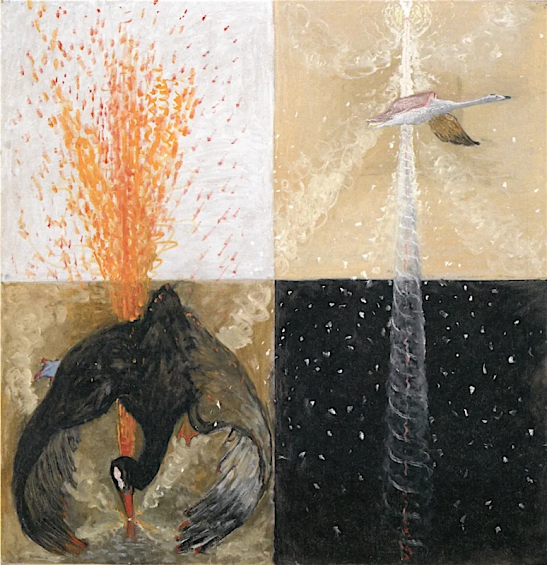అన్నమాచార్యులు
180 పడఁతి నినుఁ దలచి పో పలుకఁడతఁడు
for English version press here
సారాంశం: "ఏకమే కానీ అనేకము"
ఒకే సత్యం, అనేక మార్గాలు.
ఒకే హృదయం, ఎన్నో ఛాయలు.
ఒకే వెలుగు, అనేక ప్రతిబింబాలు.
ఒకే లోకం, ఎన్నో లోపాలు.
ఒక్కటే
మనమంతా ఒక్కటే.
కానీ పెక్కులం."
― సుజీ కాస్సెమ్, Rise Up and Salute the Sun:
కీర్తన సారాంశం:
పల్లవి: అమ్మాయి అతడు పలుకకున్నది నిను తలచి కాదు. నీ ఎడబాటుకు
కూడా కాదు. ప్రాణములు సైతము అతనికి అశాశ్వతమే. అన్వయార్ధము: మానవులారా భగవంతుని ప్రేమ మన ప్రస్తుత
చేతనావస్థకు చెందినది కాదు. మాటలకందని అతని కరుణాంతరంగము ఎడబాటులను, దేహములను, ప్రాణములను, కాలములను మించి ఆవల నిలిచి వున్న పవిత్ర హృదయములకే అనుభవమునకు
వచ్చునది.
చరణం 1: ఓ సుదతీ! "చంద్రుని వంటి
నీ ముఖము వెన్నెలలను వెదజల్లుతుంటే- బయటనున్న వెన్నెల వెలుగులో తిరగటానికి అతడిష్టపడటం
లేదేమో. ఓ ముదితా! నల్లని వెండ్రుకలతో నీకొప్పును తుమ్మెదల దండుగా తలచి అతని గుండె
ఝల్లుమనునేమో!" అని భావించకు.
చరణం 2: ఓ లలితాంగీ! “స్వామి నీ దేహలతను తలపింప జేసే లతలను ఉద్యానవనమున
చూసిన నువ్వు గుర్తుకు వస్తావని అచటికి పోవటాని కిష్టపడటం లేదని; ఓ తెల్లనిదానా! స్వామి చివురుటాకులను చూసి ఆతనికి నీ లేత పెదవులు గుర్తుకు వచ్చి గుండె తల్లడిల్లి పోతుంటాడని"
అని వూహించకు.
చరణం 3: ఓ కోమలీ! స్వామి నీతో కూడిన
సమయములను తలపోసుకొంటూ కాదు; యుక్తి, ఉపాయము, ప్రజ్ఞ, ఆలోచన, నైపుణ్యము
గల శ్రీ వేంకటాధిపుని ప్రేమ, యాతని
దృష్టి ఈ సామాన్య సరసములపైన, రసవంతమగు
చర్చలపైన వుండదు.
విపులాత్మక వివరణము
ఉపోద్ఘాతము: ఈ కీర్తన ఒక కల వంటిది. ఇందులో అన్నమాచార్యులు ఒక స్త్రీ పాత్రను వర్ణిస్తున్నారు. ఆ అమ్మాయి దైవము తన అందాలకు, తన నిష్కపట ప్రేమకు, మాటలలో చెప్పలేని తమ మధ్యవున్న బాంధవ్యమునకు కట్టుబడి వుండునని తలచి, స్వప్నలోకములలో విహరిస్తూవుంటుంది. ఆ యువతిని సంబోధిస్తూ తయారు చేసిన పాట.
అన్నమాచార్యులు అనేక విధములుగా మానవుని మనస్సులోని విషయాలను వెలికి తీయ ప్రయత్నించారు. ఓ వనితా నీవు ప్రేమించినవాడు నీ ఎడబాటు అను విరహా తాపములో కొట్టుకొని పోవుటలేదు. అసలు నీ పైన ధ్యాస వున్నదీ తెలియదు. ఉలకడు. పలకడు. చివరికి నీ ప్రాణాలను సైతం లక్ష్యపెట్టడు అని అంటారు. వానికేమి కావలెనో చెప్పకపోతే ఎవరు మాత్రము ఏమి చేయగలరు?
ఇది శృంగార కీర్తన అని నిర్ణయించుట కష్టమే. అటులని ఆధ్యాత్మ కీర్తన అని చెప్పుటకు లేదు. పాఠకులే దీనికి పరిష్కారము చూపగలరు. ఐదువందల సంవత్సరాల క్రితమే స్కిట్ వంటి కీర్తనను వ్రాయడం అన్నమాచార్యుల సృజనా శక్తికి నిదర్శనము.
|
కీర్తన:
రాగిరేకు: 85-1 సంపుటము: 5-320
|
|
పడఁతి నినుఁ దలచి పో పలుకఁడతఁడు, నీ- వెడసినను బ్రాణంబు లెరవులాతనికి ॥పల్లవి॥ వెదచల్లు నీ మోమువెన్నెలలఁ దలఁచిపో పొదలు వెన్నెలబయటఁ బొలయఁడతఁడు ముదిత నీ నెరులు దురుమును దలఁచిపో యతఁడు కొదమతేంట్ల గనిన గుండె జల్లనును ॥పడఁతి॥ లలితాంగి నీ దేహలత దలఁచి పో యిపుడు చెలఁగి వనమునకు విచ్చేయఁడతఁడు వెలఁది నీమోవికావిరి దలఁచి పో యతఁడు తలిరాకు గని గుండె తల్లడంబౌను ॥పడఁతి॥ కోమలిరో నీ యిట్ల కూటములు దలఁచిపో ప్రేమమితరములపైఁ బెట్టఁడతఁడు దీమసపు వేంకటాధిపుఁడుగన యాతనికి సామాన్యసరసతలు సరుకుగావరయ ॥పడఁతి॥
|
Details and Explanations:
ముఖ్య పదములకు అర్ధములు: ఎడసినను=ఎడబాసినప్పటికి; ఎరవులు=అన్యము, ఇతరము, అశాశ్వతము;
భావము: అమ్మాయి
అతడు పలుకకున్నది నిను తలచి కాదు. నీ ఎడబాటుకు కూడా కాదు. ప్రాణములు సైతము అతనికి అశాశ్వతమే.
వివరణము: ప్రేమ అనునది ఇరువురి
మధ్య వుదయించు రసాయనిక చర్య కాదు. అది కామకేళికి ఒక మార్గమూ కాదు. అది సమయము వృధా చేసుకొను
సాధనమూ కాదు. అది ఇంద్రియముల ద్వారా మనము గ్రహించగల విషయమూ కాదు. ప్రేమ అనునది విశ్వమానవ
చైతన్యము నందున్నదే కానీ ఏ ఒక్కరికీ చెందని, ప్రాణికోటిని కలుపు అద్వితీయమైన భగవదేచ్ఛ.
ఈ పల్లవిని వివరించుట కష్టమే.
ఎన్ని సార్లు చదివినా అర్ధమవ్వదు. సాల్వడార్ డాలీ, వాల్ట్ డిస్నీ కలిసి చేసిన "డెస్టినొ" అనే చిన్న యానిమేషన్
వీడియో ద్వారా దీనిని వివరించ బోతాను.
స్పానిష్ భాషలో "విధి"
అని అర్థం వచ్చే "డెస్టినో", డాలియా క్రోనోస్
వున్న శిల్పాన్ని సమీపించడంతో ప్రారంభమవుతుంది.
క్రోనోస్ పక్కన పెద్ద గడియారం అతడికి కాలము యొక్క ప్రభావమును తెలుపుతుంటుంది.
సినిమా అంతటా, డాలియా చుట్టూ
కరిగిపోయే లేదా విరిగిపోయే వస్తువులు ఉంటాయి, అంటే జీవితాన్ని
శాశ్వతంగా పంచుకోవడానికి ఎవరినీ కనుగొనే అదృష్టం ఆమెకు కలగదు. దీనిని చక్రవ్యూహములో
చిక్కిన జీవితము లేదా స్వచ్ఛమైన ప్రేమను పొందలేని పడతిలా వర్ణించవచ్చును.
ఆమె సాల్వడార్ డాలీ వేసిన
అనేక చిత్రాల నేపథ్యముగా నృత్యం చేస్తూ వివిధ అన్ని సన్నివేశాల లోనూ కనిపిస్తుంది.
డాలియా, క్రోనోస్ వేరు వేరు కాలములకు, దేశములకుచెందిన వారై కూడా వుండవచ్చునని
దాదాపు అన్ని సన్నివేశాలలోను ఇరువురి నేపద్థ్యము మారుతూ వుంటుంది. ఆ పెయింటింగ్స్ అధివాస్తవికమైనవి; కలలాంటివి మరియు ఆచరణ సాధ్యం కానివి. పైగా
అనుచితమైన ఆశలకు ప్రతీకలు.
డాలియా సుడివలెౘుట్టి చుట్టి
పైకిపోవునట్టి దారిలో ఎక్కుతుంది. మోసగాళ్ళ బారిన పడుతుంది. పైనుంచి క్రింద పడిపోతుంది.
గంటలా మారుతుంది. పెద్ద పెద్ద ఫోన్ల పైనుంచి
నడిపించి అతనిని చేరుకోవడానికి అన్ని ప్రయత్నాలు చేసిందని చెప్పారు. అన్నమాచార్యులు
‘పడతి’, ‘ముదిత’, ‘వెలది’, ‘లతాంగి’, ‘కోమలి’ అని సంభోదించిన
వన్నీ డాలియాకు వర్తిస్తాయి.
ఐతే ఆమె యతనములేమీ ఫలించవు.
మనమంతా జీవితములో 'డాలియా'లాగే ఎప్పటికీ తృష్ణతో వుండిపోతామని భావము.
క్రింద ఇచ్చిన చిట్టచివరికి కనబడె దృశ్యం మన వూహలతో అమర్చుకున్నదే నని, అవేవీ వాస్తవము కానవసరములేదని బోధపడుతుంది.
అన్వయార్ధము: మానవులారా భగవంతుని ప్రేమ మన ప్రస్తుత
చేతనావస్థకు చెందినది కాదు. మాటలకందని అతని కరుణాంతరంగము ఎడబాటులను, దేహములను, ప్రాణములను, కాలములను మించి ఆవల నిలిచి వున్న పవిత్ర హృదయములకే అనుభవమునకు
వచ్చునది.
ముఖ్య
పదములకు అర్ధములు: పొదలు=ప్రకాశించు, పెరుగు, వర్ధిల్లు; పొలయు= తిరుగాడు, సంచరించు.
భావము: ఓ సుదతీ!
"చంద్రుని వంటి నీ ముఖము వెన్నెలలను వెదజల్లుతుంటే- బయటనున్న వెన్నెల వెలుగులో
తిరగటానికి అతడిష్టపడటం లేదేమో. ఓ ముదితా! నల్లని వెండ్రుకలతో నీకొప్పును తుమ్మెదల
దండుగా తలచి అతని గుండె ఝల్లుమనునేమో!" అని భావించకు.
ముఖ్య
పదములకు అర్ధములు: కావిరి=లేత
ఎరుపురంగు; తలిరాకు= చిగురుటాకు; తల్లడం = అలజడి, అంతర్జ్వలనము.
భావము: ఓ లలితాంగీ! “స్వామి నీ దేహలతను తలపింప జేసే
లతలను ఉద్యానవనమున చూసిన నువ్వు గుర్తుకు వస్తావని అచటికి పోవటాని కిష్టపడటం లేదని; ఓ తెల్లనిదానా! స్వామి చివురుటాకులను చూసి ఆతనికి నీ లేత పెదవులు గుర్తుకు వచ్చి గుండె తల్లడిల్లి పోతుంటాడని"
అని వూహించకు.
ముఖ్య
పదములకు అర్ధములు: దీమసపు = యుక్తి, ఉపాయము, ప్రజ్ఞ, ఆలోచన, నైపుణ్యము గల; సరుకుగావరయ = పరీక్షించి చూచిన ఈ విషయములు ఆయన
లెక్కలోనికి రానివి.
భావము: ఓ కోమలీ!
స్వామి నీతో కూడిన సమయములను తలపోసుకొంటూ కాదు; యుక్తి, ఉపాయము, ప్రజ్ఞ, ఆలోచన, నైపుణ్యము
గల శ్రీ వేంకటాధిపుని ప్రేమ, యాతని దృష్టి ఈ సామాన్య సరసములపైన, రసవంతమగు
చర్చలపైన వుండదు.
వివరణము: దీనిని భవద్గీతలోని 5-15 శ్లోకము ద్వారా విశద పరచుకుందాము. నాదత్తే కస్యచిత్పాపం న చైవ సుకృతం విభుః । అజ్ఞానేనావృతం జ్ఞానం తేన ముహ్యంతి జంతవః ।। (భావము: సర్వాంతర్యామియైన
భగవంతుడు ఏ ఒక్కని పాపపు లేదా పుణ్య కర్మలను కానీ స్వీకరింపడు. జీవుల వివేకము అజ్ఞానముచే
కప్పబడిపోవటం వలన వారు భ్రమకు లోనగుతున్నారు).
భగవంతుని లీలలను గ్రహించలేని
అశక్తులము. కానీ, ప్రయత్నములలో మునిగి
అది చేసిన ఒప్పు, ఇది చేసిన తప్పు
అనే మీమాంసలో కొట్టుకొనిపోతుంటాము. ఆయన అనుగ్రహించిన ప్రేమను హృదయపు వాకిళ్ళు తెరచి
ఆహ్వానించలేని అసమర్థులము.
ఆర్భాటములనే కానీ అరమరికలు
లేని విశ్వవ్యాప్త కరుణను కొంతైనా వ్యాప్తి చెందించలేని అవిటివారము. శాంతి, ప్రేమ, కరుణ, జీవనము మనకు ఆదర్శములు, ధ్యేయములే కానీ వాటియందు జీవించ ఉపక్రమించము.
అటుల జీవన యాత్ర చేయుటలోని
కష్టములకు బెదిరి శ్రీశ్రీ గారన్న "అభిప్రాయాల కోసం బాధల్ని లెక్కపెట్టని వారు
మాలోకి వస్తారు. అభిప్రాయాలు మర్చుకొని సుఖాలు కామించేవారు మీలోకి పోతారు" మాటలను
ఎంతైనా నిజము చేస్తాము.
-x-x-x-



.png)
